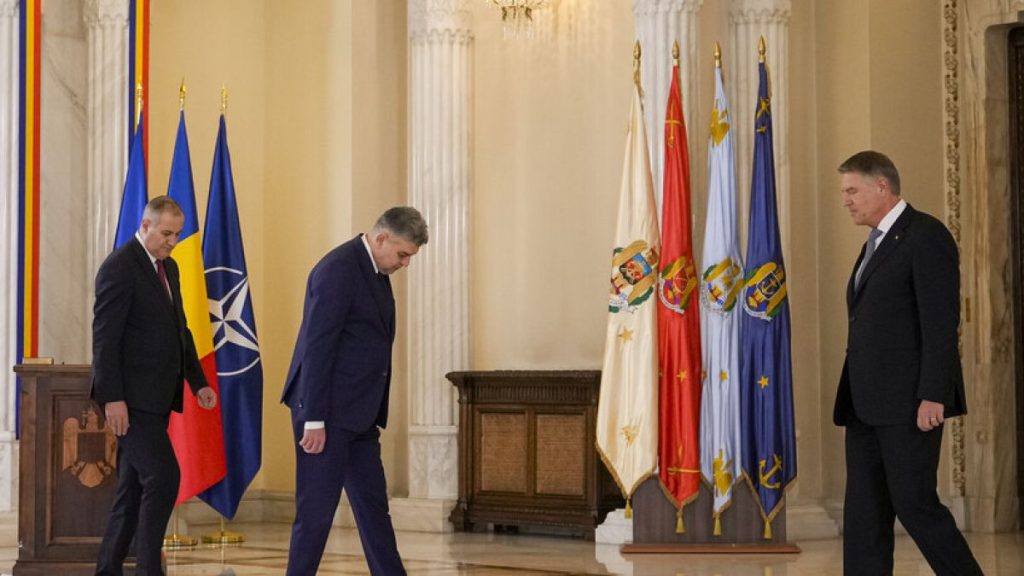Romania embarked on a new political chapter on Monday, June 12, 2024, with the swearing-in of a new government led by Prime Minister Marcel Ciolacu of the leftist Social Democratic Party (PSD). This new coalition government, formed in the wake of a tumultuous election cycle marred by controversy and political instability, has been entrusted with the crucial mandate of restoring stability and reaffirming Romania’s commitment to its pro-European trajectory. The government’s formation signals a strategic effort to counter the rise of far-right influences in the country’s political landscape and to regain public trust eroded by recent events.
The new government, a coalition comprising the PSD, the National Liberal Party (PNL), and the Democratic Alliance of Hungarians in Romania, received a comfortable majority in the parliamentary vote, securing 240 votes, exceeding the required 233. This strong parliamentary backing provides a foundation for the government to pursue its ambitious agenda of stabilizing the nation and reinforcing its European ties. The cabinet portfolios are distributed among the coalition partners, with the PSD controlling eight ministries, the PNL overseeing six, and the Democratic Alliance of Hungarians in Romania holding two. This distribution reflects the power dynamics within the coalition and ensures representation for the various political forces involved.
President Klaus Iohannis, who presided over the swearing-in ceremony, expressed his hope for the new government’s success and emphasized the importance of unity and collaboration in serving the Romanian people. He highlighted his conversations with the newly appointed ministers, noting their shared commitment to maintaining Romania’s pro-European course. This emphasis on European integration reflects a desire for stability and continued engagement with the broader European community, particularly in the context of the ongoing political and geopolitical challenges facing the region.
The backdrop against which this new government takes office is one of considerable political upheaval. The parliamentary elections, held on December 1st, saw the PSD emerge as the leading party with approximately 22% of the vote. However, these elections were overshadowed by the concurrent presidential race, which witnessed a significant surge in support for right-wing candidates, notably the far-right Alliance for the Union of Romanians, which secured a surprising second-place finish in the parliamentary elections with just over 18% of the votes. This rise of the far-right has injected an element of uncertainty into Romanian politics and fueled concerns about the country’s future direction.
The presidential election itself became a source of significant controversy and instability. The first round saw the unexpected victory of far-right outsider Calin Georgescu, a result that sent shockwaves through the Romanian political establishment. Ciolacu placed third in this round. The aftermath of the first round was marked by allegations of electoral irregularities and even suggestions of Russian interference, further deepening the political crisis. In an unprecedented move, just days before the scheduled runoff election on December 8th, Romania’s Constitutional Court annulled the presidential race, citing concerns about the integrity of the electoral process. This decision left President Iohannis in office until a new presidential election can be organized.
Prime Minister Ciolacu, acknowledging the challenging political climate, has emphasized the difficult task ahead for his government. He recognizes the deep political crisis and the erosion of public trust, and he has positioned his coalition as a force for restoring that trust and addressing the underlying issues fueling the crisis. The government faces the daunting challenge of navigating a complex political landscape while simultaneously addressing the economic and social concerns of the Romanian people. Successfully achieving this will require skillful political maneuvering, effective governance, and a commitment to upholding democratic principles and the rule of law. The government’s ability to restore stability and maintain Romania’s pro-European trajectory will be a key test of its leadership and its commitment to the Romanian people.

